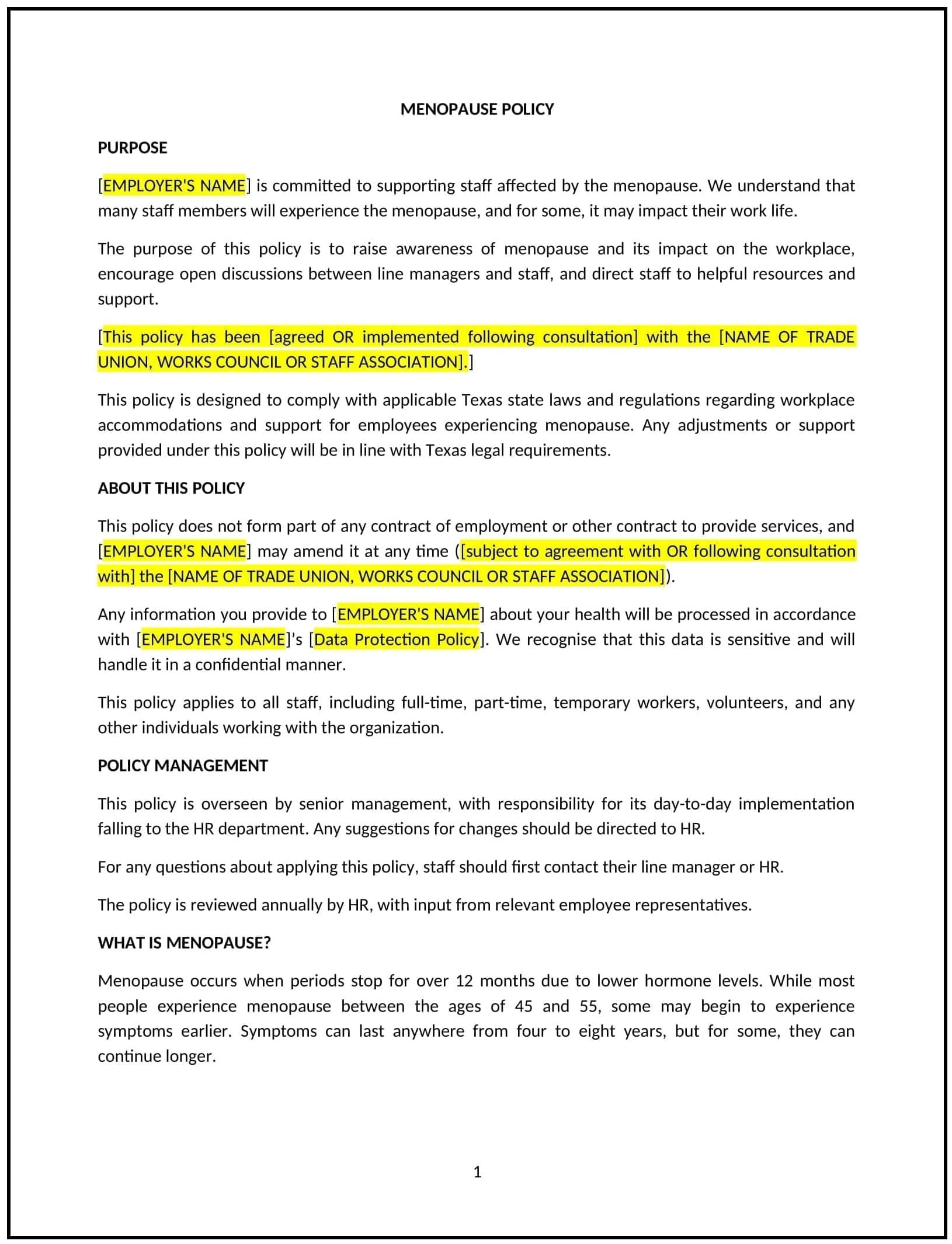Got contracts to review? While you're here for policies, let Cobrief make contract review effortless—start your free review now.

Customize this template for free
Menopause policy (Texas)
This menopause policy is designed to help Texas businesses create a supportive and inclusive work environment for employees experiencing menopause or perimenopause. The policy provides guidelines for addressing the challenges that menopause can present in the workplace, ensuring that employees receive appropriate accommodations, support, and respect during this life stage.
By adopting this policy, businesses can promote health and well-being, reduce stigma surrounding menopause, and create a more inclusive workplace for employees of all ages and genders.
How to use this menopause policy (Texas)
- Define menopause and perimenopause: Clearly explain what menopause and perimenopause are, including the symptoms employees may experience, such as hot flashes, fatigue, mood swings, sleep disturbances, and cognitive changes.
- Offer reasonable accommodations: Specify the accommodations that may be available to employees experiencing menopause, such as flexible work hours, access to private spaces, temperature control adjustments, and other measures to support well-being.
- Create a supportive environment: Outline how the company will promote awareness and understanding of menopause to reduce stigma and ensure that employees feel comfortable discussing their needs with HR or management.
- Set procedures for requesting accommodations: Define the process by which employees can request accommodations related to menopause symptoms, including who they should approach and what documentation, if any, is required.
- Address confidentiality: Ensure that any information regarding an employee’s menopause experience or accommodations is kept confidential and only shared on a need-to-know basis with authorized personnel.
- Provide health and wellness support: Offer resources such as Employee Assistance Programs (EAPs), counseling, or referrals to health professionals to support employees' physical and mental well-being during menopause.
- Set expectations for workplace behavior: Emphasize that menopause should not be used as a basis for discrimination, and that employees should be treated with dignity and respect, regardless of their menopausal status.
Benefits of using this menopause policy (Texas)
This policy offers several benefits for Texas businesses:
- Supports employee well-being: Providing accommodations for menopause-related symptoms helps employees manage their health and remain productive, reducing stress and improving job satisfaction.
- Enhances inclusion and diversity: By addressing menopause in the workplace, businesses create a more inclusive environment, recognizing the needs of employees during a natural life stage and ensuring they are supported in their careers.
- Reduces stigma and discrimination: A formal policy helps reduce stigma around menopause, encouraging open conversations and ensuring that employees are not unfairly treated or discriminated against because of menopause symptoms.
- Increases retention and productivity: Providing accommodations and support for menopause-related challenges can help improve retention by demonstrating the company’s commitment to employees' health, leading to higher engagement and lower turnover.
- Complies with discrimination laws: The policy helps businesses meet their obligations under Texas state law and federal anti-discrimination laws, ensuring that employees are not unfairly treated due to menopause or related symptoms.
Tips for using this menopause policy (Texas)
- Communicate the policy clearly: Ensure that all employees are aware of the menopause policy and understand their rights and the accommodations available to them. This can be included in the employee handbook, through HR, or in training sessions.
- Provide training for managers: Train managers and HR personnel to recognize menopause-related symptoms, understand the accommodations available, and foster a supportive environment.
- Encourage open communication: Create an environment where employees feel comfortable discussing their needs related to menopause and requesting accommodations without fear of judgment or discrimination.
- Monitor and evaluate: Regularly assess the effectiveness of the menopause policy by gathering feedback from employees and adjusting the policy or accommodations as necessary.
- Review regularly: Update the policy periodically to reflect changes in Texas state laws, federal regulations, or best practices related to menopause and employee health.